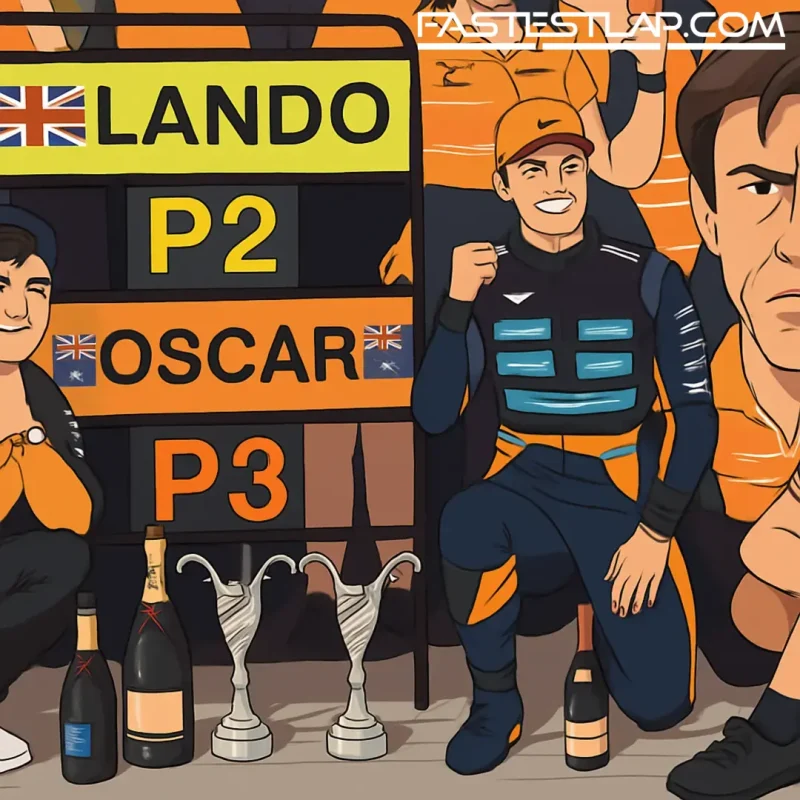Toto Wolff warns McLaren: Monza team orders set a template that’s hard to roll back
One sticky wheel nut, one calm radio call, and a championship fight nudged onto a knife-edge. McLaren’s decision at Monza to instruct Oscar Piastri to hand back position to Lando Norris after a slow stop has already become the weekend’s most argued moment, and Toto Wolff didn’t miss the significance.
Norris had been ahead of his teammate and chasing Max Verstappen for second when a sluggish front-left cost him track position. McLaren stepped in. Piastri was told to move aside — a repeat of last year’s Hungary logic — and after a brief pushback, he did. Later, the Australian called it a fair request given Norris lost out through no fault of his own.
Fair? Many will nod along. Simple? Not even close.
“There’s no right and no wrong,” Wolff said at Monza, before landing the line that will follow McLaren into the flyaways: “You set a precedent that is very difficult to undo.”
His point is the uncomfortable one teams hate to admit. If you correct one team error with an inversion, where does the line get drawn next time? Is a sticky wheel nut worthy but a faulty launch map not? What if a suspension gremlin costs a place — is that another swap? In chasing fairness, you risk drafting a rulebook you can’t fully control.
That’s the tension: Tuesday-morning ethics vs Sunday-afternoon instinct. And at McLaren, with both drivers in the title hunt, the decisions won’t get easier. Piastri left Italy with a 30-point cushion over Norris and eight race weekends still to run. The Constructors’ picture is robust. The Drivers’ title is the powder keg.
Wolff knows this world better than anyone — and also knows how badly it can burn. He lived the Hamilton–Rosberg civil war up close, a political thresher that churned through 2016. He doesn’t see that playing out at Woking.
“We had two very different animals back then,” he said, contrasting his pair’s all-out, take-no-prisoners mentality with McLaren’s calmer dynamic. The Norris–Piastri relationship is healthier, more corporate in tone, less likely to erupt. That doesn’t mean it’s easy to manage when silverware is on the line.
The Mercedes boss’ prescription was classic Toto: pick a lane, stick to it, and don’t overthink what can’t be micromanaged in the heat of battle. If the Constructors’ Championship feels comfortable, he suggested, let them race — with hard limits. Race fair, no contact, and only step in if the house catches fire. In his words, a “luxury problem.”
McLaren would argue that’s exactly what they did in Italy: keep it clean, correct an internal mistake, and get both cars home with maximum damage limitation to Verstappen. You can make a strong case for that, and it’s why plenty in the paddock found the call reasonable.
But Wolff’s warning isn’t about Monza being right or wrong; it’s about what Monza becomes. Drivers have good memories and long seasons. If you invert for a slow stop in September, you’d better be prepared to invert for an out-lap delta in October. Every precedent grows roots.
There’s also the human layer. Norris and Piastri are wired to accept team logic — until it bites at the wrong moment. If the math flips later in the year and a similar call costs a crucial win, the temperature will rise fast. That’s the moment Wolff is pointing at: when the championship truly “heats up,” and the rationale that felt tidy at Monza starts to fray under pressure.
The irony, of course, is that this is a sign of how far McLaren has come. Team orders debates only find you when you’re winning — or close enough to taste it. Andrea Stella’s group has earned that problem the hard way.
So where does that leave the papaya brigade? Clear policy, transparent thresholds, and ruthless consistency, even when it stings. If McLaren are going to correct for team-induced harm, they’ll need a framework their drivers can bank on without needing a lawyer on the intercom. If they’re going to loosen the reins, they’ll need to trust Norris and Piastri to race like adults and be ready to punish the first breach. Either way works. Waffling won’t.
Monza will fade in the rear-view, but the message won’t: McLaren chose fairness over fortune on Sunday. The next time the coin lands differently, we’ll find out if that choice was philosophy or convenience. And by then, with a Drivers’ Championship in the balance, the cost of being wrong will be a lot higher than one slow front-left.








